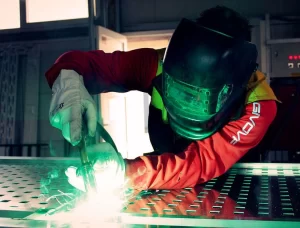The transportation sector relies heavily on efficient welding processes to keep global commerce moving smoothly. Ensuring the seamless operation of transportation fleets is crucial for maintaining supply chain efficiency. However, delays in production and vehicle downtime due to inadequate welding can have significant consequences. By embracing stress-free welding solutions, transportation companies can reduce production delays, enhance vehicle longevity, and streamline fleet maintenance. Yet, the advantages of stress-free welding go beyond these immediate advantages, emphasizing the need to explore its full impact on transportation operations.
Key Takeaways
- Stress-free welding reduces production delays in transit, allowing for quicker turnaround times and improved overall efficiency.
- Relaxed welding processes enhance vehicle durability, minimizing the risk of weld cracks and fatigue, and extending vehicle lifespan.
- Error-free welding ensures the final product meets quality standards, promoting consistency and reliability, and improving overall performance.
- Stress-free welding optimizes fleet maintenance, streamlining schedules, allocating resources effectively, and reducing downtime for smooth operations.
- By minimizing delays and downtime, stress-free welding contributes to seamless transportation industry operations, enhancing supply chain efficiency.
Reducing Production Delays in Transit
By integrating trouble-free welding into their manufacturing process, transportation companies can significantly decrease production delays in transit, allowing for quicker turnaround times and improved overall efficiency. This streamlined approach reduces downtime, leading to faster delivery of goods and services. The Benefits of stress-free welding in this scenario are clear, as it allows for a more agile and responsive transportation network.
Enhanced Vehicle Durability Benefits
Relaxed welding processes significantly enhance vehicle durability by minimizing the risk of weld cracks and fatigue, ultimately leading to extended vehicle lifespan and reduced maintenance requirements. This leads to a significant decrease in repair costs and downtime, ensuring that vehicles remain operational for longer periods, thereby promoting seamless transportation.
Minimizing Errors in Welding Processes
One of the most significant advantages of stress-free welding is that it drastically reduces the likelihood of errors in welding processes, thereby ensuring that the final product meets the desired quality standards. By minimizing mistakes, stress-free welding solutions promote consistency and reliability, resulting in improved overall performance and reduced downtime for transportation fleets.
Increased Efficiency in Fleet Maintenance
Optimized fleet maintenance is a direct consequence of stress-free welding, as it empowers transportation companies to streamline their maintenance schedules and allocate resources more effectively. With reduced downtime and increased productivity, stress-free welding facilitates companies to minimize delays and keep their fleets running smoothly, ultimately contributing to the advantages of stress-free welding in the transportation industry.

Frequently Asked Questions
What Causes Stress in Traditional Welding Processes?
In traditional welding processes, tension is primarily caused by the high temperatures, rapid cooling rates, and resulting thermal expansion and contraction, leading to residual tensions, warping, and distortion in the welded components.
Can Stress-Free Welding Be Used for All Vehicle Types?
While stress-free welding offers numerous benefits, its applicability varies across vehicle types, with some designs and materials being more suitable than others, necessitating careful evaluation and customization for best results.
How Does Stress-Free Welding Impact Environmental Sustainability?
Tension-free welding contributes to environmental sustainability by reducing energy consumption, minimizing waste, and promoting the use of recyclable materials, ultimately decreasing the carbon footprint of the transportation industry.
Are There Any Certifications for Stress-Free Welding Professionals?
Yes, tension-free welding professionals can obtain certifications from organizations like the American Welding Society (AWS) and the American Society of Mechanical Engineers (ASME), ensuring compliance with industry standards and best practices.
Can Stress-Free Welding Be Integrated With Existing Production Lines?
Yes, stress-free welding can be seamlessly integrated into existing production lines, allowing for improved manufacturing efficiency and reduced downtime, while maintaining high-quality welds and minimizing production costs.
Conclusion
In summary, the implementation of stress-free welding solutions in transportation industries yields significant benefits. By mitigating production delays, enhancing vehicle durability, minimizing errors, and optimizing fleet maintenance, stress-free welding processes contribute to increased efficiency and reduced downtime. This, in turn, streamlines supply chain operations, leading to improved productivity and overall performance. The integration of stress-free welding solutions is, therefore, an essential factor in achieving seamless transportation operations.
You May Also Like:




